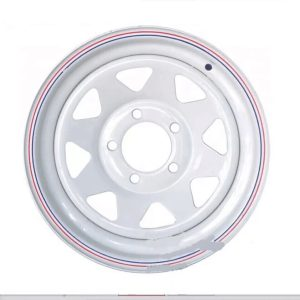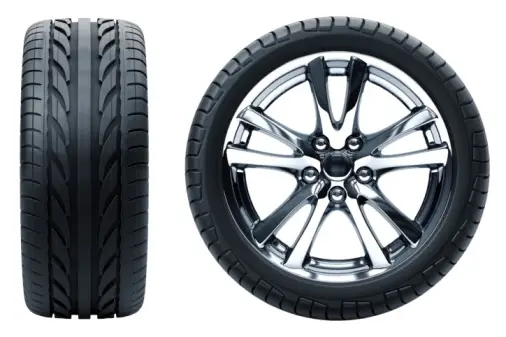Understanding Steel Rims
What Are Steel Rims?
Steel rims are a type of wheel rim made from steel, an alloy primarily composed of iron and carbon. Their strength and economy make them commonplace in cars, particularly heavy-duty and commercial vehicles. Steel rims are renowned for their durability and usefulness, in contrast to alloy rims which are frequently made for aesthetic appeal.
How Are Steel Rims Made?
The manufacturing process of steel rims involves several stages. First, high-quality steel sheets are stamped into the desired shape through a series of presses. These steel blanks are then formed into the wheel’s shape through welding and rolling processes. After shaping, they undergo a heat treatment process to enhance their strength and durability. Finally, the rims are coated with a protective layer to prevent rust and corrosion.
Characteristics of Steel Rims
Steel rims are renowned for their durability and ruggedness. The primary characteristics that set them apart include high tensile strength, resistance to impact, and lower cost compared to alloy rims. They are also heavier, which can contribute to a stable ride but may affect fuel efficiency. Additionally, steel rims are less prone to cracking under stress, making them a reliable choice for challenging driving conditions.
Durability of Steel Rims
Factors Affecting Durability
Several factors influence the durability of steel rims. Understanding these can help you make informed decisions about their usage and maintenance.
Material Strength
The strength of the steel used in the manufacturing of the rims is a crucial factor. High-quality steel that undergoes proper heat treatment processes ensures that the rims can withstand significant stress and impact without bending or breaking.
Manufacturing Quality
Not all steel rims are created equal. The quality of manufacturing processes, including precision in stamping, welding, and heat treatment, plays a vital role in determining the rim’s strength and durability. Rims made with high-quality manufacturing standards are more likely to resist bending and damage.
Usage Conditions
The conditions under which the vehicle operates also affect the longevity and resilience of steel rims. Driving on rough terrain, frequently encountering potholes, or carrying heavy loads can stress the rims, increasing the risk of bending. Conversely, driving on smooth roads and maintaining proper tire inflation can enhance the durability of steel rims.
By understanding these factors and their impact on steel rims, you can better appreciate why they are a trusted choice for many vehicle owners.
Common Causes of Bent Steel Rims
Driving Over Potholes and Curbs
One of the most common causes of bent steel rims is driving over potholes and curbs. These sudden, hard impacts can exert significant force on the rims, causing them to deform. Potholes, in particular, can be deceptive, appearing harmless but hiding deep craters that result in substantial damage. Curbs, while seemingly benign, can also cause similar issues if driven over at the wrong angle or speed.
Impact from Accidents or Collisions
Accidents and collisions are another major cause of bent steel wheels. Even minor fender-benders can result in enough force to bend or damage a steel rim. The impact can occur from various directions and angles, exerting pressure on different parts of the rim. This not only affects the aesthetic appearance of the rim but can also lead to issues with wheel alignment and vehicle handling.
Weight Load and Overloading
Overloading your vehicle can be detrimental to steel rims as well. Steel rims are designed to handle a specific amount of weight, and consistently exceeding this limit adds undue stress. This stress can lead to bending or even cracking, particularly if combined with rough driving conditions. It’s crucial to be aware of your vehicle’s load capacity and avoid exceeding it to maintain the integrity of your rims.
Preventive Measures for Avoiding Bent Steel Rims
Proper Tire Maintenance and Inflation
Maintaining proper tire pressure is vital to avoiding bent steel rims. Under-inflated tires can cause the rims to bear more of the impact when driving over obstacles, increasing the likelihood of bending. Regularly checking and maintaining the correct tire pressure can distribute the impact more evenly and protect the rims. Additionally, ensuring your tires are in good condition and free from excessive wear can provide extra cushioning and protection.
Safe Driving Practices
Adopting safe driving practices can significantly reduce the risk of bending your steel rims. This includes avoiding sudden stops and starts, navigating around potholes and obstacles, and steering clear of curbs. Slowing down when driving over uneven surfaces and being mindful of road conditions can prevent unnecessary stress on the rims. Safe driving not only extends the lifespan of your rims but also enhances overall vehicle safety.
Regular Inspections and Maintenance
Regular inspections and maintenance are essential for the longevity of steel rims. Routinely checking for signs of damage, such as dents or uneven wear, can help identify potential issues early. Expert examinations guarantee that any damage is quickly fixed, especially when tires are rotated or oil is changed. The rims’ condition is also much improved by routine maintenance, which includes alignment and balancing.
Repairing Bent Steel Rims
Identifying a Bent Rim
Identifying a bent rim is the first step in addressing the issue. Signs of a bent rim include vibrations while driving, uneven tire wear, and a visible deformity in the rim. If you notice any of these symptoms, it’s essential to inspect your rims closely or have a professional do so. Early detection can prevent further damage and ensure safe driving.
Professional Repair vs. DIY Repair
When it comes to repairing bent steel rims, you have two options: professional repair or DIY repair. Professional repair services have the tools and expertise to fix the damage effectively, ensuring the rim is safe to use. DIY repair, while cost-effective, requires a certain level of skill and the right equipment. It’s crucial to assess the severity of the bend and your ability to repair it before attempting a DIY fix. In many cases, professional repair is the safer and more reliable option.
Choosing the Right Rim for Your Vehicle
Selecting the right rim for your vehicle involves considering various factors. Even while steel wheels are affordable and durable, you should select rims that are appropriate for the circumstances and demands of your driving. Think about things like your driving style, your weight, and your taste in design. Speaking with an expert can offer insightful information and enable you to make an educated choice.
Leading producer in the automotive sector Vesteon Wheel Company provides a large selection of steel rims that are renowned for their outstanding quality and robustness. Vesteon Wheel Company has become known in the industry as a dependable and high-performance supplier by concentrating on producing such goods.
The steel rims manufactured by Vesteon Wheel Company, like white coating wheels, are designed to meet the diverse needs of customers. These rims are made from high-quality steel material, ensuring strength and resilience. With a variety of sizes and finishes available, customers can choose the perfect steel rims to suit their vehicles. Whether it’s for car repair stores, auto parts shops, or car modification stores, Vesteon Wheel Company’s steel rims are a popular choice for those looking to change, update, or replace their old or damaged wheels. Besides, steel rims, their forged wheels and casting alloy wheels are also ideal products for consumers. With their commitment to quality and adherence to international standards, Vesteon Wheel Company continues to be a reliable and preferred supplier of steel rims in the automotive industry.
Final Thoughts
Steel rims are a robust and cost-effective choice for many vehicle owners. While they can bend under certain conditions, understanding the factors that affect their durability and taking preventive measures can significantly enhance their lifespan. By maintaining proper tire pressure, adopting safe driving practices, and ensuring regular inspections and maintenance, you can keep your steel rims in optimal condition. Whether you’re dealing with bent rims or choosing new ones, being informed can help you make the best choices for your vehicle’s performance and safety.


